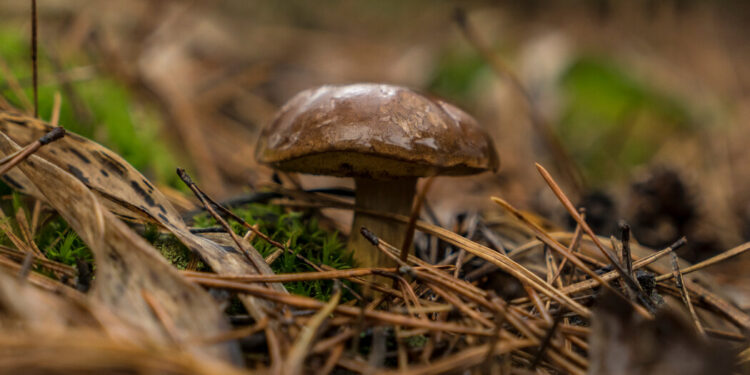ZDVYZHIVKA, Ukraine – Deep in a pine forest to the north of Kyiv, the Ukrainian capital, a beautiful mushroom warmed its brown hat in the gentle autumn sun – it was an irresistible sight for Ukrainian mushroom hunters.
But there was danger everywhere. Cutting through the mossy forest floor was line after line of trenches from the Battle of Kyiv Last winter, countless mines and unexploded ordnance. Weighing in on the danger of mines and the allure of their quarry, thousands of Ukrainians are in for their first mushroom season since Russian invasion They caught mushrooms.
Now, they’re post-picking for the season, rounding up their spoils and setting out to preserve them for the hard winter ahead. The danger may seem extreme for what was long seen as a pastoral pastime, but Ukrainian mushroom hunters see it differently. They are passionate about their quiet walks in the woods, seeing them as a sign of Ukraine’s resilience and a way to maintain normal life during the war.
“I wanted to return to a quiet life,” said Dmytro Boydenok, 52, a yoga teacher from the Kyiv suburb of Buka, who was hunting mushrooms in late autumn.
He said he saw such mushroom expeditions “symbolic to me because they are peaceful hunting” in a forest that has seen so much violence. In the facades and lawns, the rust of bursting tanks. Earlier this fall while foraging for mushrooms, he stumbled upon the makeshift grave of a child.
People who have lived through the horrors of war often find great solace in routine. But many have now lost their jobs and depend on mushrooms to make money and keep food for the winter. Mushroom hunters may have lost loved ones, but they weren’t ready to lose the glimpses of their former lives that they found in the damp, misty autumnal forests.
As the war drags on into its tenth month, the government and people of Ukraine remain defiant, even Electricity flashesWater taps dry up And the flats hover around freezing temperatures from lack of heating Like Russian missiles Attacking infrastructure targets.
Ukrainians, many of whom have second homes in villages and feel a connection to the countryside, even if they live in towns or cities, said they never knelt to anyone — but would do it to pick potatoes or photograph mushrooms.
And so Mr. Poyedynok rode his bike in the pine forests around Bucha, carrying some plastic bags, which he did all his life.
Lived through Busa’s Occupation, prof The month of terror During which the Russian soldiers They shot civilians And the They left their dead bodies in the streets. He said that his uncle had been killed and that he himself had been arrested and threatened with execution.
Forests in occupied areas are still heavily mined. Mines and unexploded ordnance cover thousands of square miles of Ukrainian territory, According to the Minister of InteriorDennis Monastyrsky.
Ukraine’s government has pleaded with people not to pick mushrooms, and the state agency for forest resources has formally restricted forest walks in nine Ukrainian provinces, including the area around Kiev where Mr Boydenok goes.
But specialists say it will take at least a decade to clear the forests – and many Ukrainians were unwilling to wait that long before returning to their favorite pastime.
Reports of mushroom poachers trampling mines were received regularly from all nine counties where forest walks were banned. Local officials said the numbers are not very high on the scale of a war that is believed to have killed tens of thousands: Three to four people in each district have stepped on mines or died or lost their legs while foraging for mushrooms.
“Generally people are careful, but not all are like that,” said Victoria Ruban, a spokeswoman for the Kyiv County Emergency Service, which responds to calls when mushroom hunters set foot on the mines.
Mr. Poyedynok used to teach busy yoga classes, but only a few of his students remain in Ukraine. With the money he could earn from teaching greatly reduced, he helped mushrooms, as he often did in times of famine or hardship in the Ukraine.
He said he was able to pick 550 pounds of mushrooms. His family kept plenty of treats for the winter and gave many to friends and relatives. They also started selling mushrooms.
Some buyers are mushroom pickers who crave amusement but are very wary of entering the woods.
Mr. Poyedynok’s wife, Yana Poyedynok, said, “Those who always go picking mushrooms but are now afraid started coming to us just to smell the mushrooms, look at them, and eventually they started buying them.”
The family made about $1,000 this season selling mushrooms.
It’s not much, but it did cover some small expenses,” said Ms. Boydenock, 44.
Most of the time Mr. Poyedynok went mushroom hunting alone.
After the journey with his family when he found the child’s grave, his wife and son were afraid of the forests, and now they rarely go to him. They only go to forests they have already been to, and to those they think are safe.
As Russian soldiers withdraw from parts of Ukraine, celebration It generally proves short-lived. Soon after, the bodies were found and accounts of atrocities against civilians. But these deaths are in the past. The dangers in the forests threaten death today, and for any number of tomorrows.
In September, when the most Kharkiv region In the northeast it was taken, it was on the cusp of mushroom season. Within weeks, reports began coming in of mushroom pickers trampling mines. Local officials said three of them were maimed in October in newly restored forests.
Investigators found it in a forest on the outskirts of Izium, a city in Kharkiv Hundreds of graves Officials said there were civilians and mass graves where Ukrainian soldiers appeared to be buried.
Not far from this forest lives Raisa Derevyanko, 65 years old. In September, she looked from a bench outside her home where human remains were being exhumed. Now, she could watch mine clearance work.
Mushroom season came and went, but she never reached the forest.
“It’s all very appalling,” Ms. Derevyanko said of the mass graves. “But what I want most is to end my deforestation. I miss mushrooms so much.”


























